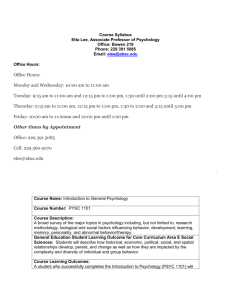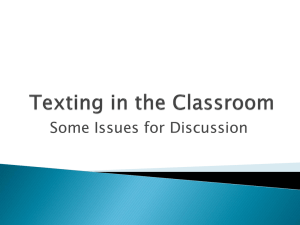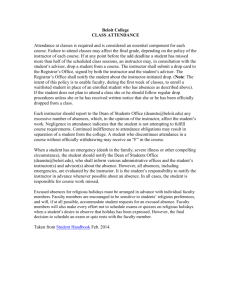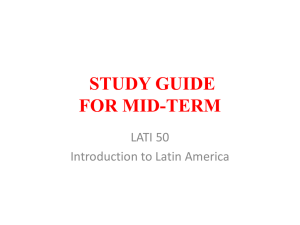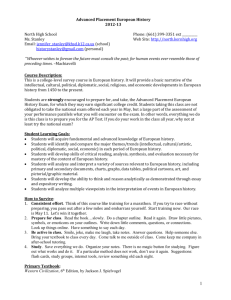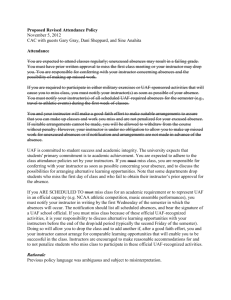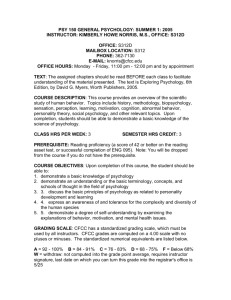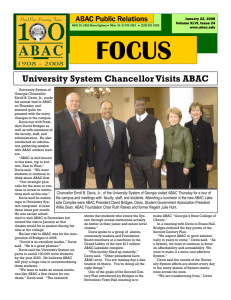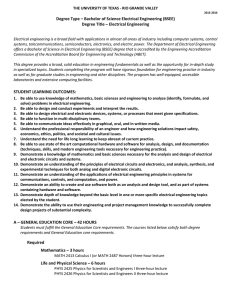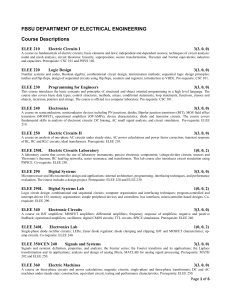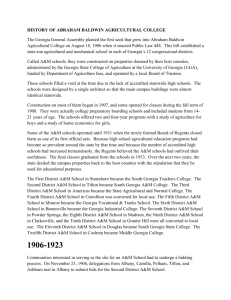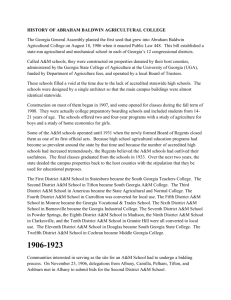Course Syllabus
advertisement
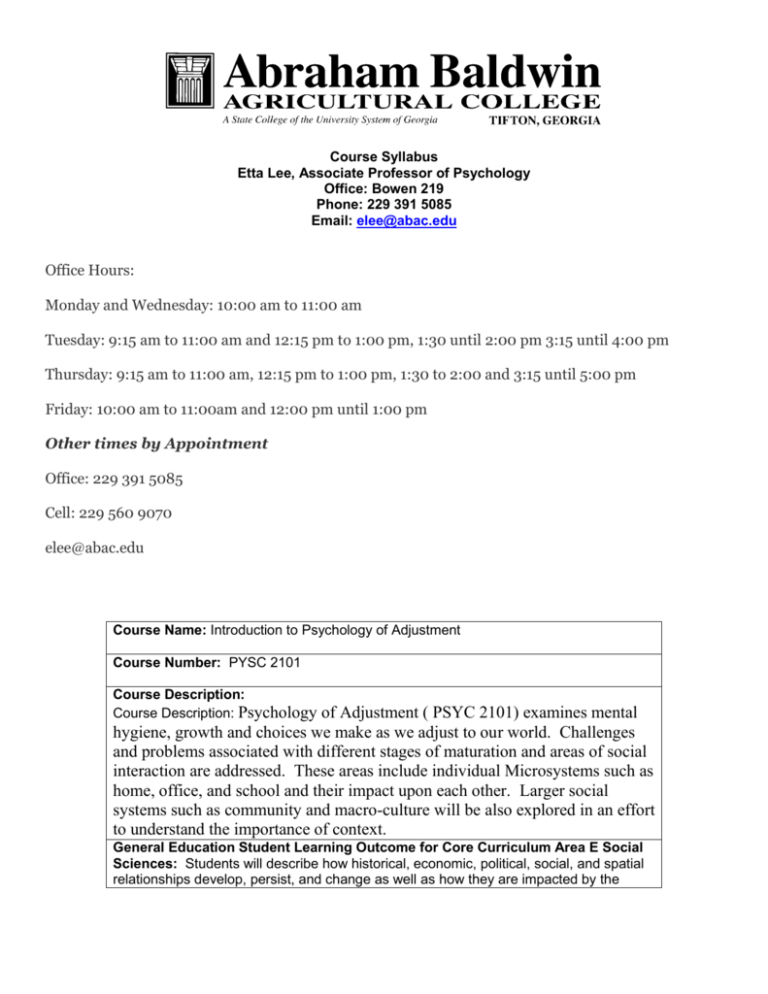
Course Syllabus Etta Lee, Associate Professor of Psychology Office: Bowen 219 Phone: 229 391 5085 Email: elee@abac.edu Office Hours: Monday and Wednesday: 10:00 am to 11:00 am Tuesday: 9:15 am to 11:00 am and 12:15 pm to 1:00 pm, 1:30 until 2:00 pm 3:15 until 4:00 pm Thursday: 9:15 am to 11:00 am, 12:15 pm to 1:00 pm, 1:30 to 2:00 and 3:15 until 5:00 pm Friday: 10:00 am to 11:00am and 12:00 pm until 1:00 pm Other times by Appointment Office: 229 391 5085 Cell: 229 560 9070 elee@abac.edu Course Name: Introduction to Psychology of Adjustment Course Number: PYSC 2101 Course Description: Course Description: Psychology of Adjustment ( PSYC 2101) examines mental hygiene, growth and choices we make as we adjust to our world. Challenges and problems associated with different stages of maturation and areas of social interaction are addressed. These areas include individual Microsystems such as home, office, and school and their impact upon each other. Larger social systems such as community and macro-culture will be also explored in an effort to understand the importance of context. General Education Student Learning Outcome for Core Curriculum Area E Social Sciences: Students will describe how historical, economic, political, social, and spatial relationships develop, persist, and change as well as how they are impacted by the complexity and diversity of individual and group behavior. Course Learning Outcomes: Upon completing PSYC 2101, you will have been exposed to five major unit objectives and should gain both a conceptual and practical (applied) understanding of the material: The student will define, describe and apply psychology and the major personality theories. The student will demonstrate understanding of research methods and issues The student will describe the effects of stress and the different coping mechanisms. The student will identify factors that affect the definition of self and others. The student will list and describe factors that affect and define relationships The student will identify factors that affect physical and mental health. The student will identify and define psychological disorders The student will describe major milestones in human development. The student will demonstrate an understanding of different factors affecting career choices and the impact of work on self and relationships To complete this course you should be able to communicate your ability to understand these concepts in both oral and written form. This course is a four-fold learning process with respect to the material: definition of the concepts covered, assessment of yourself, application of knowledge to enrich your own growth, and evaluation of the application process. College Policy on Course Attendance: Courses at ABAC are provided for the intellectual growth and development of students. The interaction with instructors and other students is an important element of the learning process, and a high correlation exists between class attendance and course grades. Therefore, to attain maximum success, students should attend all their classes, be on time, and attend all scheduled course activities. Absence from class does not excuse students from full responsibility for class work or assignments missed. Students must accept this responsibility. Individual instructors will establish attendance policies for each class, will publish the policy in the course syllabus, and keep attendance records. The penalty for absences is at the discretion of the instructor and may include failure of the course. Students who stop attending class without officially withdrawing will receive a grade for the course. A student penalized for excessive absences may appeal through the grade appeal process as stated in this catalog and the Student Handbook. Instructor’s view: You are an adult and are expected to be responsible for all material covered. Points lost from absences will be due to missed assignments. In addition: Engaged Student Learning Requirements: The ABAC Credit Hour Policy, in accordance with the Board of Regents of the University System of Georgia and federal regulations that are reflected in SACSCOC’s Credit Hours Policy Statement, require 6750 minutes of engaged student learning for a 3 semester hour course. Engaged Student Learning occurs both in and outside of the classroom at the ratio of 1:2, Two hours of independent student learning for each hour of classroom learning. 15 weeks of 50 minutes of class instruction for 1 credit hour = 750 minutes. For a 3 Hr course, engaged classroom instruction will equal 2250 minutes, the remaining 4500 minutes of engaged learning will be the responsibility of each individual student. Institutional Absence A student who serves as an official representative of the college is defined as one who: 1. is authorized to use the college name in public relationships outside the institution; 2. regularly interacts with non-college individuals and groups over an extended period of time (at least one semester); 3. represents the college as a part of a group and not as an individual; 4. represents the college under the direct supervision of a college faculty or staff member; and 5. is authorized in writing, in advance, by the President of the college. Such a student is in no way released from the obligations and responsibilities of all students, but will not be penalized with unexcused absences when absences result from regularly scheduled activities in which he/she represents the college. Further, it is the responsibility of each student to contact instructors prior to the absence and to make arrangements to make up any work that will be missed, in a manner acceptable to the instructor. Advisors of activities will schedule off-campus activities in a manner that does not unduly disrupt the learning process for a student. College Policy on Academic Dishonesty: Academic irregularities include, but are not limited to, giving or receiving unauthorized assistance in the preparation of any academic assignment; taking or attempting to take, stealing, or otherwise obtaining in an unauthorized manner any material pertaining to the education process; selling, giving, lending, or otherwise furnishing to any person any question and/or answers to any examination known to be scheduled at any subsequent date; fabricating, forging, or falsifying lab or clinical results; plagiarism in any form related to themes, essays, term papers, tests, and other assignments; breaching any confidentiality regarding patient information For more information on Disciplinary Procedures associated with Academic Dishonesty, please refer to the Academic Code of Conduct in the Student Handbook. If there is a student in this class who has specific needs because of learning disabilities or any other disability, please feel free to contact the instructor. This is a partial syllabus. More detailed information relating to the class and Instructor will be made available to each student. Assessment of Outcomes: There will be two major components of your overall grade. Unit Exams (600 points) There will be a 6 unit exams each worth 100 points. Each exam will be taken individually and will cover material from the textbook, powers points, discussions, and lecture. There will be a mixture of some multiple-choice, some short answer, and essay questions on each exam. Journals (100 points) You will be required to keep a journal for this class. The journal will include refection on assigned topics covered during class. You will be expected to turn in your journal each week on an assigned date for grading. If you fail to turn in your journal during the assigned time, you will lose credit for that week's work. Grading scale A (90-100%) B (80-90%) C (70-80%) D (60-70%) F (less than 60%) Other warnings: Warnings (may result in lost participation points and/or removal from or denial to class) Texting, Texting, Texting, and Texting Reading material not related to the course during class Sleeping, talking, or sleeping and talking in class REPEATEDLY leaving the classroom before class is dismissed REPEATEDLY entering the classroom after class has started Making repetitive noises, i.e. clicking pens, popping gum, tapping shoes Talking out loud, whispering, rolling eyes or similar disrespecting behavior All make up work must be done in the time allotted and with prior approval.
